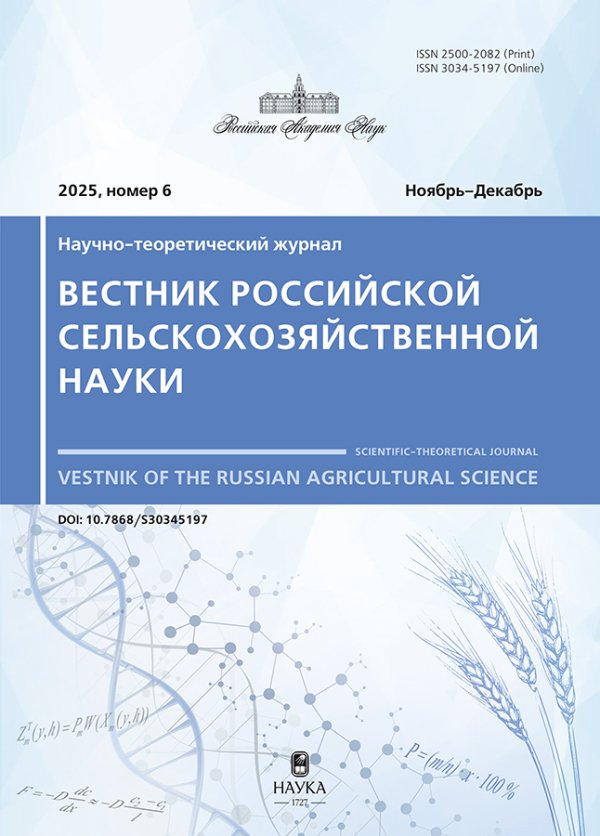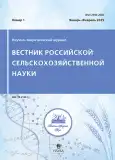Influence of Vetosporin-G on the bee colons development in the conditions of the Tyumen Region
- Authors: Domatskaya T.F.1, Domatsky А.N.1
-
Affiliations:
- All-Russian Scientific Research Institute of Veterinary Entomology and Arachnology – Branch of Federal State Instution Federal Research Centre Tyumen Scientific Centre of Siberian Branch of the Russian Academy of Sciences
- Issue: No 1 (2025)
- Pages: 71-74
- Section: Veterinary entomology
- URL: https://journal-vniispk.ru/2500-2082/article/view/287069
- DOI: https://doi.org/10.31857/S2500208225010168
- EDN: https://elibrary.ru/CRVPQP
- ID: 287069
Cite item
Full Text
Abstract
The effect of the probiotics Vetosporin-Zh, PcheloNormoSil and ApiVrach on the lifespan of bees was studied in laboratory conditions.For this purpose, 26 cages containing 50 three-day-old bees were selected, which were divided into 4 groups (3 experimental groups of 7 cages each and a control group of 5 cages).In the experiment, bees were fed sugar syrup containing drugs in accordance with the instructions for their use. In the control bees were given sugar syrup. The studies were carried out in accordance with “Methodological recommendations for studying the toxic effects of pesticides and biological products on bees”. It was established that of the tested drugs, only Vetosporin-Zh significantly increased the lifesspan of experimental bees compared to the control by 1.4 times. To conduct research in the apiary, 14 bee colonies were selected and divided into 2 equal groups – experimental and control. Experimental colonies were fed 1 liter of sugar syrup containing 1 ml of Vetosporin-Zh three times with an interval of 3 days. Control colonies received syrup without the drug. Inspection of bee colonies was carried out every 12 days, and the number of frames, printed brood and honey in each family was taken into account. Determined that feeding experimental bee colonies with sugar syrup containing Vetosporin Zh – contributed to an increase in their strength by 1.3 times, printed brood and honey by 1.3–1.4 times compared to control families.
Keywords
Full Text
Массовое заболевание пчел варроатозом в 70-е годы прошлого века привело к резкому снижению резистентности насекомых к другим заразным болезням и появлению смешанных инвазий-инфекций, вызывающих ослабление и гибель пчелиных семей во всем мире. Широкое применение химических акарицидов и антибиотиков для лечения пчел способствует их накоплению в продуктах пчеловодства, в связи с чем возникает необходимость поиска экологически безопасных средств и методов, направленных на эффективное лечение и повышение устойчивости пчелиных семей к патогенам. Многие исследования сосредоточены на улучшении здоровья медоносных пчел с помощью пробиотиков, усиливающих врожденный иммуннитет к микробным инфекциям. Опыты, проведенные на пасеке в северной лесной зоне Республики Башкортостан, выявили положительное воздействие пробиотиков СпасиПчел и ПчелоНормоСил на состояние пчелиных семей. [7] Те, что получали СпасиПчел осенью, превосходили контрольную группу по силе на 21,3%, количеству запечатанного расплода следующей весной – на 58,7%. Пчелиные семьи, подкармливаемые пробиотиком ПчелоНормоСил, весной несколько отставали по силе от контрольных семей, но превосходили их на 23,5% по количеству запечатанного расплода. [6] В природно-климатических условиях Южного Урала и Поволжья изучено влияние подкормок с использованием микробиологических препаратов на хозяйственно полезные и продуктивные показатели пчел. Кормовая добавка Ветоспорин-Ж при весенней подкормке пчел способствовала более активному наращиванию силы пчелиных семей при подготовке к главному медосбору, увеличению летной активности и повышению продуктивности. [5]
Есть данные по действию пробиотика Ветоспорина-Ж на физиолого-биохимическое состояние медоносной пчелы в норме и при развитии патологических процессов в кишечнике, вызванных имидаклопридом. Он оказывает адаптогенное влияние на рабочих пчел летней генерации при интоксикации этим препаратом. [2]
Анализ литературных данных по применению пробиотиков для лечения пчел и повышения их резистентности к различным патогенам свидетельствует о необходимости расширения исследований, направленных на разработку экологически безопасных методов.
МАТЕРИАЛЫ И МЕТОДЫ
Для проведения исследований мы отобрали пробиотические препараты:
АпиВрач – жидкость, содержащая биомассу бактерий Bacillus subtilis 12B, Bacillus subtilis11B, Bacillus subtilis 1K, Bacillus subtilis 3H, Bacillus subtilis 3K в среде культивирования. Общее количество жизнеспособных клеток бактерий в 1 мл корма не менее 1х108 КОЕ. Препарат рекомендован для биологической защиты пчел от вирусных, бактериальных и грибковых заболеваний.
ПчелоНормоСил – содержит живые клетки молочно-кислых бактерий Lactobacillus plantarum, Lactobacillus acidophlus, Enterococcus faecium, дрожжей-сахаромицетов Saccharo-myces cerevisiae в среде культивирования. Общее количество жизнеспособных клеток лактобактерий, энтерококков и дрожжей в 1 мл корма не менее 1х108 КОЕ. Пробиотик применяют для увеличения продолжительности жизни рабочих пчел, повышения яйценоскости пчелиных маток, наращивания силы пчелиных семей.
Ветоспорин-Ж включает биомассу споровых бактерий Bacillus subtilis 12B, Bacillus subtilis11В в среде культивирования. Общее количество жизнеспособных клеток бактерий в 1 мл корма не менее 1х108 КОЕ. Препарат предназначен для повышения неспецифической резистентности, сохранности и продуктивности животных, в том числе птиц, рыб и пчел.
Для лабораторных опытов было отобрано 26 садков по 50 пчел трехдневного возраста, которые поделили на четыре группы (три опытные по 7 садков и контрольная – 5). Первой опытной группе скармливали по 10 мл сахарного сиропа, включающего 0,2% препарата Апиврач, второй – 10 мл сиропа с содержанием 0,5% пробиотика ПчелоНормоСил, третьей – 10 мл с 0,1% Ветоспорина-Ж. Контрольные пчелы получали чистый сахарный сироп в указанном объеме. После сиропа с пробиотиками пчелам всех групп скармливали сахарный сироп. Учет гибели пчел вели ежедневно до тех пор, пока не умирали все насекомые. Продолжительность жизни определяли в соответствии с Методическими рекомендациями по изучению токсического действия пестицидов и биопрепаратов на пчел. [3] По результатам лабораторного опыта для дальнейших исследований был выбран Ветоспорин-Ж.
На пасеке 14 пчелиных семей поделили на две группы с учетом их силы и возраста маток (опытная и контрольная). В соответствии с инструкцией по применению препарата опытным семьям трехкратно с трехдневным интервалом скармливали по 1 л сахарного сиропа, содержащего 1 мл Ветоспорина-Ж, контрольным – только сироп без препарата. Опыт проводили со 2 мая по 19 июня 2024 года. Пчелиные семьи осматривали через каждые 12 дн., учитывали количество рамок, печатного расплода и меда в каждой семье. [3]
РЕЗУЛЬТАТЫ И ОБСУЖДЕНИЕ
Исследования в лабораторных условиях показали, что из всех испытанных пробиотиков только Ветоспорин-Ж достоверно увеличивал продолжительность жизни пчел (табл. 1).
Таблица 1.
Влияние пробиотиков на продолжительность жизни пчел, M ± m
Группа | M ± m | Lim (min ± max) | Ƿ (размах) |
АпиВрач | 7,41 ± 0,49 | 5,84 ± 10,06 | 4,2 |
ПчелоНормоСил | 5,51 ± 0,31 | 4,38 ± 7.58 | 3,2 |
Ветоспорин-Ж | 8,51 ± 0,42 | 5,98 ± 9,78 | 3,8 |
Сахарный сироп | 6,03 ± 0.68 | 4,16 ± 7,76 | 3,6 |
Опытные семьи, получавшие корм с Ветоспорином-Ж достоверно отличались от контрольных, подкармливаемых только сахарным сиропом (табл. 2.).
Таблица 2.
Состояние пчелиных семей после подкормки Ветоспорином-Ж, M ± m
Дата | Группа | |||||
опытная | контрольная | |||||
число рамок с пчелами, шт. | количество печатного расплода, см2 | количество меда, кг | число рамок с пчелами, шт. | количество печатного расплода, см2 | количество меда, кг | |
02.05. | 6,1 ± 0,7 | 2464,3 ± 94,83 | 5,7 ± 0,49 | 6,0 ± 0,6 | 2392,8 ± 84,1 | 6,0 ± 0,9 |
14.05. | 7,6 ± 0,5 | 2571,42 ± 70,1 | 6,5 ± 0,5 | 6,6 ± 0,7 | 2442,8 ± 54,5 | 6,4 ± 0,7 |
26.05. | 9,1 ± 0,7 | 4200,0 ± 200,7 | 8,6 ± 1,0 | 7,8 ± 0,4 | 3935,7 ± 266,7 | 7,3 ± 0,8 |
07.06. | 11,2 ± 0,8 | 5026,5 ± 268,2 | 12,8 ± 1,2 | 8,2 ± 0,5 | 4100,0 ± 100,5 | 8,1 ± 0,4 |
19.06. | 12,5 ± 0,8 | 5445,7 ± 346,4 | 13,7 ± 1,1 | 9,4 ± 0,5 | 4185,7 ± 180,9 | 9,4 ± 0,5 |
Подкормка опытных пчелиных семей сахарным сиропом, содержащим Ветоспорин – Ж, способствовала увеличению их силы в 1,3 раза, печатного расплода и меда – 1,3…1,4 раза, по сравнению с контрольными (дата учета – 19.06.2024). Результаты наших исследований согласуются с данными, полученными другими учеными. Г.С. Мишуковская, Н.Р. Мурзабаев, Т.Н. Кузнецова доказали, что применение Ветоспорина-Ж положительно влияет на хозяйственно полезные признаки пчелиных семей, заключающееся в стимуляции процессов их весеннего развития и повышения продуктивности. [4] Штаммы Bacillus обладают биотерапевтическим потенциалом, который связан с их способностью взаимодействовать с внутренней средой хозяина, продуцируя разнообразные антимикробные пептиды и небольшие внеклеточные эффекторные молекулы.
По данным Л.А. Бондыревой и А.С. Попеляева в условиях Алтайского края весной часто применяют стимулирующие подкормки в виде сахарно-медового теста (канди) с добавлением пробиотических препаратов, под воздействием которых нормализуются микрофлора кишечника, кислотность среды, пищеварение, а также подавляются рост и размножение патогенной и условно-патогенной микрофлоры. [1]
Молочнокислые бактерии Lactobacillus kunkei – важная группа микробиоты кишечника медоносной пчелы. Они участвуют в переваривании пищи, стимулируют иммунную систему и могут противодействовать нежелательным микроорганизмам в желудочно-кишечном тракте. Выявлена антагонистическая активность девяти отобранных штаммов Lactobacillus kunkei по отношению к возбудителю аскосфероза пчел грибу Ascosphaera apis. [9] Результаты показали способность штаммов L. kunkeei ингибировать A. apis, образовывать биопленки, также выявлена их высокая агрегация и гидрофобность. Установлено, что применение корма BioPatty, включающего лактобациллы, снижало уровень инфицированности пчелиных семей американским гнильцом. [10] При нозематозе в лабораторных и пасечных условиях изучили влияние двух штаммов (Bifidobacterium coryneforme и Apilactobacillus kunkeei) на уровень зараженности пчел возбудителем болезни – микроспоридией Nosema ceranae. В обоих случаях количественные ПЦР и микроскопические анализы показали снижение числа спор возбудителя в организме пчел. [11]
Таким образом, литературные данные и собственные опыты свидетельствуют о необходимости расширения научных исследований по разработке экологически безопасных лекарственных средств для применения в пчеловодстве.
About the authors
T. F. Domatskaya
All-Russian Scientific Research Institute of Veterinary Entomology and Arachnology – Branch of Federal State Instution Federal Research Centre Tyumen Scientific Centre of Siberian Branch of the Russian Academy of Sciences
Author for correspondence.
Email: varroa54@mail.ru
PhD in Biological Sciences
Russian Federation, TyumenА. N. Domatsky
All-Russian Scientific Research Institute of Veterinary Entomology and Arachnology – Branch of Federal State Instution Federal Research Centre Tyumen Scientific Centre of Siberian Branch of the Russian Academy of Sciences
Email: varroa54@mail.ru
PhD in Biological Sciences
Russian Federation, TyumenReferences
- Bondyreva L.A., Popelyaev A.S. Vliyanie probioticheskih podkormok na sostav mikroflory kishechnika pchel // Vestnik Altajskogo gosudarstvennogo agrarnogo universiteta № 1 (207). 2022. S. 79–81. https://doi.org/10.53083/1996-4277-2022-207-1-79-83
- Gajfullina L.R., Saltykova E.S., Matniyazov R.T., Nikolenko A.G. Optimal’nye usloviya primeneniya probiotikov v kachestve adaptogenov na osnove analiza immunogo statusa medonosnoj pchely // Biomika. 2016. T. 8. № 2. S. 76–81.
- Metodicheskie rekomendacii po izucheniyu toksicheskogo dejstviya pesticidov i biopreparatov na pchel», M., 1989. 19 s.
- Mishukovskaya G.S., Murzabaev N.R., Kuznecova T.N. Hozyajstvenno poleznye priznaki pchel pri ispol’zovanii mikrobiologicheskih preparatov // Izvestiya Orenburgskogo gosudarstvennogo universiteta. 2013. S. 163–165.
- Mishukovskaya G.S., Murzabaev N.R., Kuznecova T.N. Probioticheskaya kormovaya dobavka «Vetosporin-Zh». Pchelovodstvo. 2014. № 7. S. 14–16.
- Mishukovskaya G., Giniyatullin M., Tuktarov Ya. et al. Effect of Probiotic Feed Additives on Honeybee Colonies Overwintering // American Journal of Animal and Veterinary Sciences 2020. No. 15 (4). PP. 284–290. https://doi.org/10.3844/ajavsp. 2020.284.290
- Mishukovskaya G., Giniyatullin M., Shelekhov D. et al. The use of probiotics in spring supplementary feeding of bee colonies //Bulgarian Journal of Agricultural Science. No. 1. 2023. PP. 131–137.
- Brendan A. Daisley, Andrew P. et al. Novel probiotic approach to counter Paenibacillus larvae infection in honey bees // The ISME Journal. 2020. No. 14. PP. 476–491. https://doi.org/10.1038/s41396-019-0541-6
- Fouad M.F. Elshaghabee, Namita Rokana, Rohini D. Gulhane et al. Bacillus As Potential Probiotics: Status, Concerns, and Future Perspectives//Frontiers in Microbiology. 2017. Vol. 8. PP. 1–14. https://doi.org/10.3389/fmicb.2017.01490
- Garrido P.M, Porrlni M.P., Alberoni D. et al. Beneficial Bacteria and Plant Extracts Promote Honey Bee health and Reduce Nosema ceranae Infection // Probiotics and Antimicrobial Proteins. 2024. No. 16. PP. 259–274. https://doi.org/10.1007/s12602
- Iorizzo M., Lombardi S.J, Ganassi S. et al. Antagonistic Activity against Ascosphaera apis and Functional Properties of Lactobacillus kunkeei Strains //Antibiotics. 2020. No. 9. P. 262. https://doi.org/10.3390/antibiotics9050262
Supplementary files










